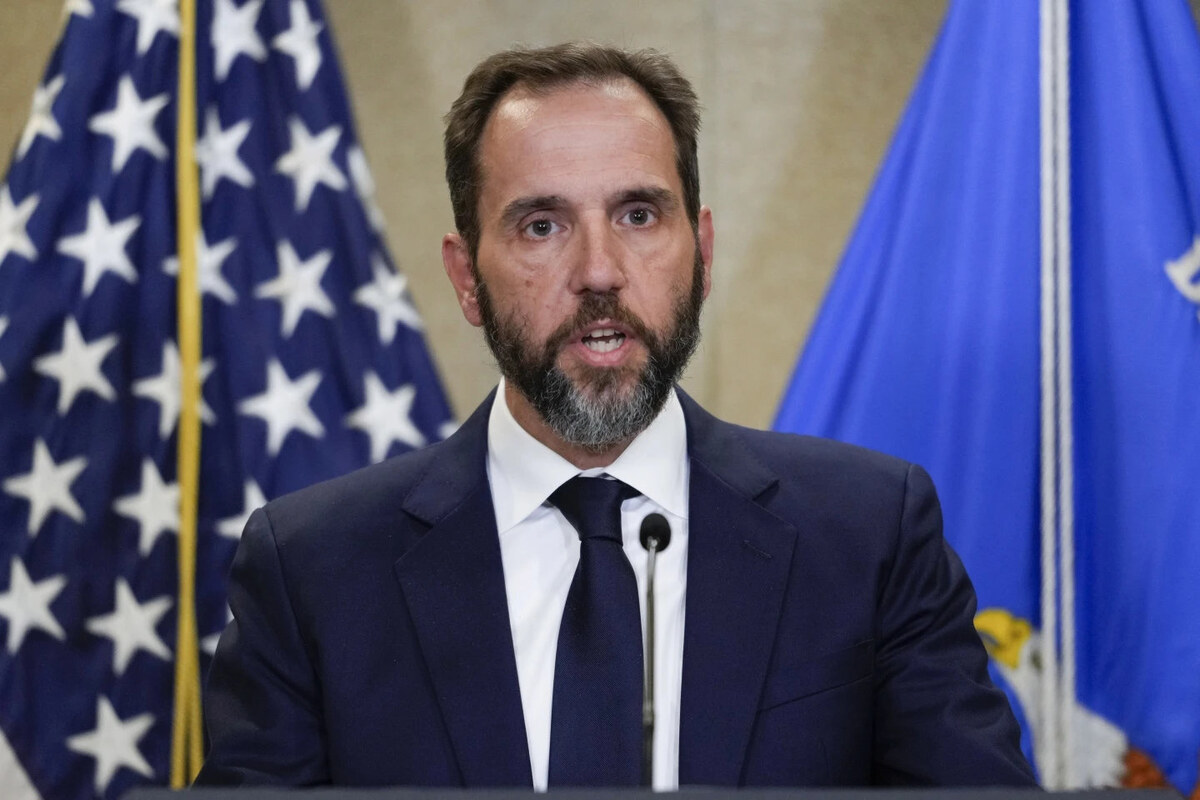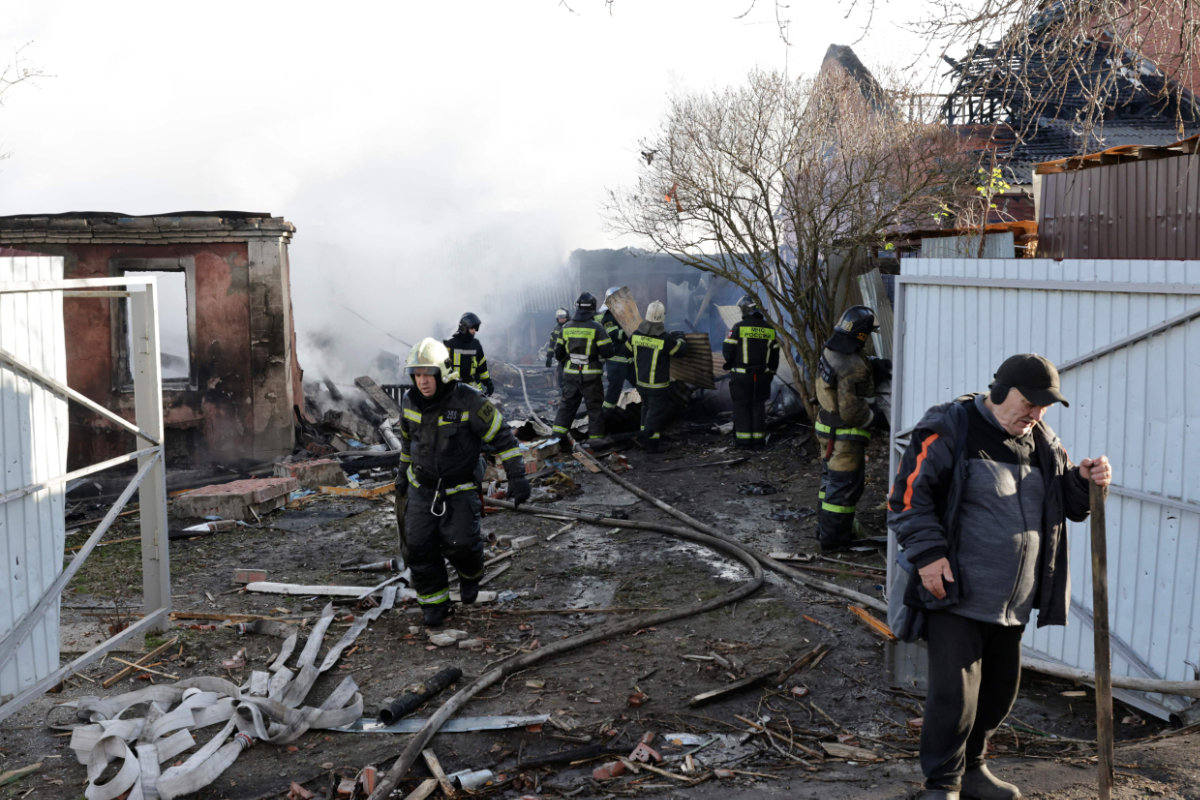WASHINGTON: Donald Trump has said he wouldn’t be a dictator — “except for Day 1.” According to his own statements, he’s got a lot to do on that first day in the White House.
His list includes starting up the mass deportation of migrants, rolling back Biden administration policies on education, reshaping the federal government by firing potentially thousands of federal employees he believes are secretly working against him, and pardoning people who were arrested for their role in the riot at the Capitol on Jan. 6, 2021.
“I want to close the border, and I want to drill, drill, drill,” he said of his Day 1 plans.
When he took office in 2017, he had a long list, too, including immediately renegotiating trade deals, deporting migrants and putting in place measures to root out government corruption. Those things didn’t happen all at once.
How many executive orders in the first week? “There will be tens of them. I can assure you of that,” Trump’s national press secretary, Karoline Leavitt, told Fox News on Sunday.
Here’s a look at what Trump has said he will do in his second term and whether he can do it the moment he steps into the White House:
Make most of his criminal cases go away, at least the federal ones
Trump has said that “within two seconds” of taking office that he would fire Jack Smith, the special counsel who has been prosecuting two federal cases against him. Smith is already evaluating how to wind down the cases because of long-standing Justice Department policy that says sitting presidents cannot be prosecuted.
Smith charged Trump last year with plotting to overturn the results of the 2020 presidential election and illegally hoarding classified documents at his Mar-a-Lago estate in Florida.

Special Counsel Jack Smith speaks to the media on AUg. 1, 2023, about an indictment of former President Donald Trump. (AP/File)
Trump cannot pardon himself when it comes to his state conviction in New York in a hush money case, but he could seek to leverage his status as president-elect in an effort to set aside or expunge his felony conviction and stave off a potential prison sentence.
A case in Georgia, where Trump was charged with election interference, will likely be the only criminal case left standing. It would probably be put on hold until at least 2029, at the end of his presidential term. The Georgia prosecutor on the case just won reelection.
Pardon supporters who attacked the Capitol
More than 1,500 people have been charged since a mob of Trump supporters spun up by the outgoing president attacked the Capitol almost nearly four years ago.
Trump launched his general election campaign in March by not merely trying to rewrite the history of that riot, but positioning the violent siege and failed attempt to overturn the 2020 election as a cornerstone of his bid to return to the White House. As part of that, he called the rioters “unbelievable patriots” and promised to help them “the first day we get into office.”

Supporters of Donald Trump climb the west wall of the US Capitol Building in Washington on January 6, 2021. (AP/File)
As president, Trump can pardon anyone convicted in federal court, District of Columbia Superior Court or in a military court-martial. He can stop the continued prosecution of rioters by telling his attorney general to stand down.
“I am inclined to pardon many of them,” Trump said on his social media platform in March when announcing the promise. “I can’t say for every single one, because a couple of them, probably they got out of control.”
Dismantle the ‘deep state’ of government workers
Trump could begin the process of stripping tens of thousands of career employees of their civil service protections, so they could be more easily fired.
He wants to do two things: drastically reduce the federal workforce, which he has long said is an unnecessary drain, and to “totally obliterate the deep state” — perceived enemies who, he believes, are hiding in government jobs.
Within the government, there are hundreds of politically appointed professionals who come and go with administrations. There also are tens of thousands of “career” officials, who work under Democratic and Republican presidents. They are considered apolitical workers whose expertise and experience help keep the government functioning, particularly through transitions.
Trump wants the ability to convert some of those career people into political jobs, making them easier to dismiss and replace with loyalists. He would try to accomplish that by reviving a 2020 executive order known as “Schedule F.” The idea behind the order was to strip job protections from federal workers and create a new class of political employees. It could affect roughly 50,000 of 2.2 million civilian federal employees.
Democratic President Joe Biden rescinded the order when he took office in January 2021. But Congress failed to pass a bill protecting federal employees. The Office of Personnel Management, the federal government’s chief human resources agency, finalized a rule last spring against reclassifying workers, so Trump might have to spend months — or even years — unwinding it.
Trump has said he has a particular focus on “corrupt bureaucrats who have weaponized our justice system” and “corrupt actors in our national security and intelligence apparatus.”
Beyond the firings, Trump wants to crack down on government officials who leak to reporters. He also wants to require that federal employees pass a new civil service test.
Impose tariffs on imported goods, especially those from China
Trump promised throughout the campaign to impose tariffs on imported goods, particularly those from China. He argued that such import taxes would keep manufacturing jobs in the United States, shrink the federal deficit and help lower food prices. He also cast them as central to his national security agenda.
“Tariffs are the greatest thing ever invented,” Trump said during a September rally in Flint, Michigan.

This photo taken on April 18, 2024 shows BYD electric cars for export waiting to be loaded onto a ship at a port in Yantai, in eastern China's Shandong province. (AFP)
The size of his pledged tariffs varied. He proposed at least a 10 percent across-the-board tariff on imported goods, a 60 percent import tax on goods from China and a 25 percent tariff on all goods from Mexico — if not more.
Trump would likely not need Congress to impose these tariffs, as was clear in 2018, when he imposed them on steel and aluminum imports without going through lawmakers by citing Section 232 of the Trade Expansion Act of 1962. That law, according to the Congressional Research Service, gives a president the power to adjust tariffs on imports that could affect US national security, an argument Trump has made.
“We’re being invaded by Mexico,” Trump said at a rally in North Carolina this month. Speaking about the new president of Mexico, Claudia Sheinbaum, Trump said: “I’m going to inform her on Day 1 or sooner that if they don’t stop this onslaught of criminals and drugs coming into our country, I’m going to immediately impose a 25 percent tariff on everything they send into the United States of America.”
Roll back protections for transgender students
Trump said during the campaign that he would roll back Biden administration action seeking to protect transgender students from discrimination in schools on the first day of his new administration.
Opposition to transgender rights was central to the Trump campaign’s closing argument. His campaign ran an ad in the final days of the race against Vice President Kamala Harris in which a narrator said: “Kamala is for they/them. President Trump is for you.”

An activist holds a sign calling for federal protections of transgender rights, in front of the US Supreme Court in Washington, DC, on April 1, 2023. (AFP)
The Biden administration announced new Title IX protections in April that made clear treating transgender students differently from their classmates is discrimination. Trump responded by saying he would roll back those changes, pledging to do some on the first day of his new administration and specifically noting he has the power to act without Congress.
“We’re going to end it on Day 1,” Trump said in May. “Don’t forget, that was done as an order from the president. That came down as an executive order. And we’re going to change it — on Day 1 it’s going to be changed.”
It is unlikely Trump will stop there.
Speaking at a Wisconsin rally in June, Trump said “on Day 1” he would “sign a new executive order” that would cut federal money for any school “pushing critical race theory, transgender insanity and other inappropriate racial, sexual or political content onto the lives of our children.”
Trump hasn’t said how he would try to cut schools’ federal money, and any widespread rollback would require action from Congress.
Drill, drill, drill
Trump is looking to reverse climate policies aimed at reducing planet-warming greenhouse gas emissions.
With an executive order on Day 1, he can roll back environmental protections, halt wind projects, scuttle the Biden administration’s targets that encourage the switch to electric cars and abolish standards for companies to become more environmentally friendly.
He has pledged to increase production of US fossil fuels, promising to “drill, drill, drill,” when he gets into office on Day 1 and seeking to open the Arctic wilderness to oil drilling, which he claims would lower energy costs.
Settle the war between Russia and Ukraine
Trump has repeatedly said he could settle the war between Russia and Ukraine in one day.
When asked to respond to the claim, Russia’s UN ambassador, Vassily Nebenzia, said “the Ukrainian crisis cannot be solved in one day.”

Rescuers clean debris in the courtyard of a house following a Ukrainian drone attack in the village of Stanovoye, Moscow region, on Nov. 10, 2024, amid the ongoing war between Russia and Ukraine. (AFP)
Leavitt, the Trump press secretary, told Fox News after Trump on Wednesday was declared the winner of the election that he would now be able to “negotiate a peace deal between Russia and Ukraine.” She later said, “It includes, on Day 1, bringing Ukraine and Russia to the negotiating table to end this war.”
Russia invaded Ukraine nearly three years ago. Trump, who makes no secret of his admiration for Russian President Vladimir Putin, has criticized the Biden administration for giving money to Ukraine to fight the war.
At a CNN town hall in May 2023, Trump said: “They’re dying, Russians and Ukrainians. I want them to stop dying. And I’ll have that done — I’ll have that done in 24 hours.” He said that would happen after he met with Ukrainian President Volodymyr Zelensky and Putin.
Begin mass deportations of migrants in the US
Speaking last month at his Madison Square Garden rally in New York, Trump said: “On Day 1, I will launch the largest deportation program in American history to get the criminals out. I will rescue every city and town that has been invaded and conquered, and we will put these vicious and bloodthirsty criminals in jail, then kick them the hell out of our country as fast as possible.”
Trump can direct his administration to begin the effort the minute he arrives in office, but it’s much more complicated to actually deport the nearly 11 million people who are believed to be in the United States illegally. That would require a huge, trained law enforcement force, massive detention facilities, airplanes to move people and nations willing to accept them.
Trump has said he would invoke the Alien Enemies Act. That rarely used 1798 law allows the president to deport anyone who is not an American citizen and is from a country with which there is a “declared war” or a threatened or attempted “invasion or predatory incursion.”
He has spoken about deploying the National Guard, which can be activated on orders from a governor. Stephen Miller, a top Trump adviser, said sympathetic Republican governors could send troops to nearby states that refuse to participate.
Asked about the cost of his plan, he told NBC News: “It’s not a question of a price tag. It’s not — really, we have no choice. When people have killed and murdered, when drug lords have destroyed countries, and now they’re going to go back to those countries because they’re not staying here. There is no price tag.”

























